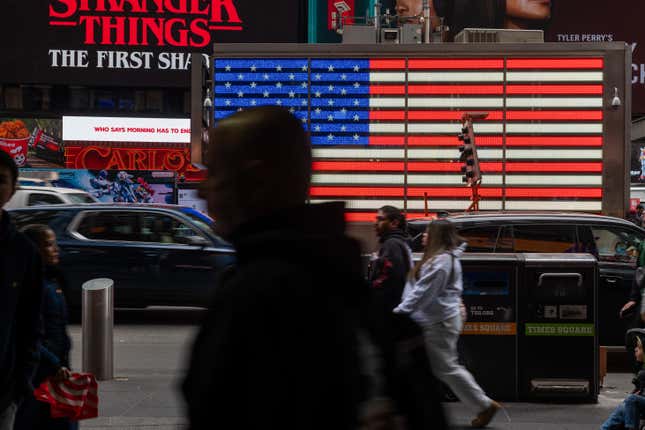
In This Story
President Donald Trump’s trade war and other policies unpopular abroad are deterring inbound tourism and triggering boycotts that will make a measurable if modest dent in U.S. economic growth, according to Goldman Sachs (GS) economists.
Based on past episodes of reduced favorability toward the U.S., such as the Iraq War and Trump’s first term, there will be a 0.2% to 0.3% drag on GDP, according to the bank’s Global Economics Analyst note dated Monday evening. The Canadian economy may get a boost from a shift to its own domestically made products.
“Although small, this headwind provides an additional reason why U.S. GDP growth will likely underperform consensus expectations in 2025,” Joseph Briggs and Megan Peters wrote.
Trump is scheduled to unveil additional tariffs on Wednesday. The announcement will focus on “country-based” duties, and White House Press Secretary Karoline Leavitt told reporters Monday that while the president still plans sectoral tariffs, they won’t be the focus of Wednesday’s event. Trump said Sunday that he plans to start reciprocal tariffs with “all countries,” countering speculation he might limit their initial scope.
While the declines have been greatest in Canada, Denmark, and other Nordic countries, the recent worsening of global sentiment toward the U.S. has been broad-based. Public views of the U.S. have improved only in Russia and China this year, according to the Goldman economists.
The most pronounced effect of that poor sentiment will be on tourism, which accounts for 0.7% of GDP, with arrivals at U.S. airports falling 11% year-on-year following recent tariff threats, the Goldman economists said.
For goods, they wrote, “the declines in favorability and purchase intentions are mostly confined to companies like Tesla (TSLA) that are associated with President Trump.” Boycotts may have a bigger impact if they extend to U.S. multinationals’ products produced abroad, they added.